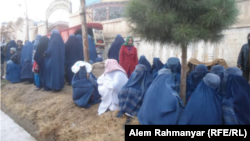Rape, forced marriages, and child soldiers - life under Islamic State in Afghanistan
| Publisher | Radio Free Europe/Radio Liberty |
| Publication Date | 12 August 2018 |
| Cite as | Radio Free Europe/Radio Liberty, Rape, forced marriages, and child soldiers - life under Islamic State in Afghanistan, 12 August 2018, available at: https://www.refworld.org/docid/5bc05267a.html [accessed 30 October 2019] |
| Disclaimer | This is not a UNHCR publication. UNHCR is not responsible for, nor does it necessarily endorse, its content. Any views expressed are solely those of the author or publisher and do not necessarily reflect those of UNHCR, the United Nations or its Member States. |
August 12, 2018 12:29 GMT
By Alem Rahmanyar, Frud Bezhan
 Displaced women from the Darzab and Qush-Teppa districts wait for assistance in Sheberghan.
Displaced women from the Darzab and Qush-Teppa districts wait for assistance in Sheberghan.
SHEBERGHAN, Afghanistan – Clad in a dusty blue burqa and clutching a piece of stale bread, Khaleda cowers in front of her three wailing young children in a makeshift refugee camp in northern Afghanistan.
The 35-year-old, who only goes by one name, is among thousands of people who recently escaped the brutal rule of the Islamic State (IS) extremist group in the Darzab district of Jawzjan Province, a stronghold of the militants for the past year.
Now living among hundreds of other families in a bulging camp on the outskirts of the provincial capital, Sheberghan, Khaleda recalls the horrors of life under the militants.
"They took young girls away and forcibly married them," says Khaleda, holding her 3-year-old daughter who is clutching a water bottle. "I saw them kill people from my village. They forced young boys to fight for them. We couldn't do anything."
The IS group's local affiliate in Afghanistan has gained an unrivaled reputation for brutality, regularly beheading their rivals or forcing them to stand on land mines.
But while forced marriages and rape have been committed by the extremist group in Iraq and Syria, they have been less reported in Afghanistan, where sexual violence is a social taboo.
But stories like those told by Khaleda have emerged in recent weeks as thousands have fled Darzab.
IS militants were ousted from Darzab by a rival militant group, the Taliban, and Afghan security forces on July 31 after weeks of fierce clashes. Dozens of IS fighters were killed and over 200 surrendered to government forces.
Many residents fled during the fighting to Sheberghan, where thousands like Khaleda live off of food and water handouts from the local government and foreign aid groups.
"It was in the middle of the night," says Khaleda, a native of the village of Sardara whose husband works as a laborer in neighboring Iran. "We got on a motorcycle. We only had the clothes we were wearing. We left everything else behind."
Khaleda says she, like many others, remains wary of returning to their homes over fears IS may return.
'They Raped Her'
Maryam, who fled Darzab last week, lives with her husband and two children in the makeshift camp in Sheberghan. The 28-year-old recalls how her 15-year-old sister was kidnapped by IS fighters.
"Daesh fighters came to my mother's house," says Maryam, using the Arabic name for the IS group. "They killed my brother-in-law. They took away my youngest sister to another village. They raped her and forced her to marry a Daesh leader."
Maryam says she does not know her sister's whereabouts or if she is even alive.
Besides brutalizing women, IS fighters have also killed local elders and those who they considered government sympathizers. Locals say the militants also used children as soldiers, a claim supported by the high number of children or young men among the IS fighters who surrendered to government forces.
Fatima, another resident of Darzab, lost her husband to the extremists. "My husband was a villager elder," says the elderly woman, who lives in a crowded tent in Sheberghan with her relatives. "The Daesh fighters came to our house and killed him in front of me. They committed many cruel acts."
The stories from Afghanistan mirror those in Syria and Iraq, where IS militants systemically enslaved and raped women, publicly executed prisoners, and used children as soldiers and suicide bombers.
Small But Potent
IS militants have a small but potent presence in Afghanistan, where they first emerged in 2015.
In 2017, the militants captured Darzab and the district of Qush Tepa in Jawzjan, a remote province that borders Turkmenistan and is on a key drug-smuggling route. The militants were ousted from the province after months of U.S.-Afghan air strikes and ground operations that killed local IS leaders. The IS fighters had to also deal with a massive Taliban offensive in the area.
Despite its setback in Jawzjan, the IS group has a foothold in the eastern province of Nangarhar, along the Pakistani border, from where it has attacked Afghan and international security forces, religious minorities, and foreign workers in cities like Jalalabad and the capital, Kabul.
The IS affiliate in Afghanistan is not a monolithic group nor a direct extension of the extremist group in Iraq and Syria – representing more of an alliance of splinter groups from the Afghan and Pakistani Taliban with elements of regional militant groups such as the Islamic Movement of Uzbekistan and the Pakistan-based Lashkar-e Jhangvi.
There are some 2,000 IS fighters in Afghanistan, where U.S. and Afghan forces have waged a relentless campaign to destroy the group. Washington and Kabul have claimed their campaign has killed hundreds of militants and commanders, including its leaders, although residents in eastern Afghanistan say the extremists retain control over significant territory.
Frud Bezhan is a correspondent for RFE/RL who covers Afghanistan, Iran, and Pakistan.
Link to original story on RFE/RL website
